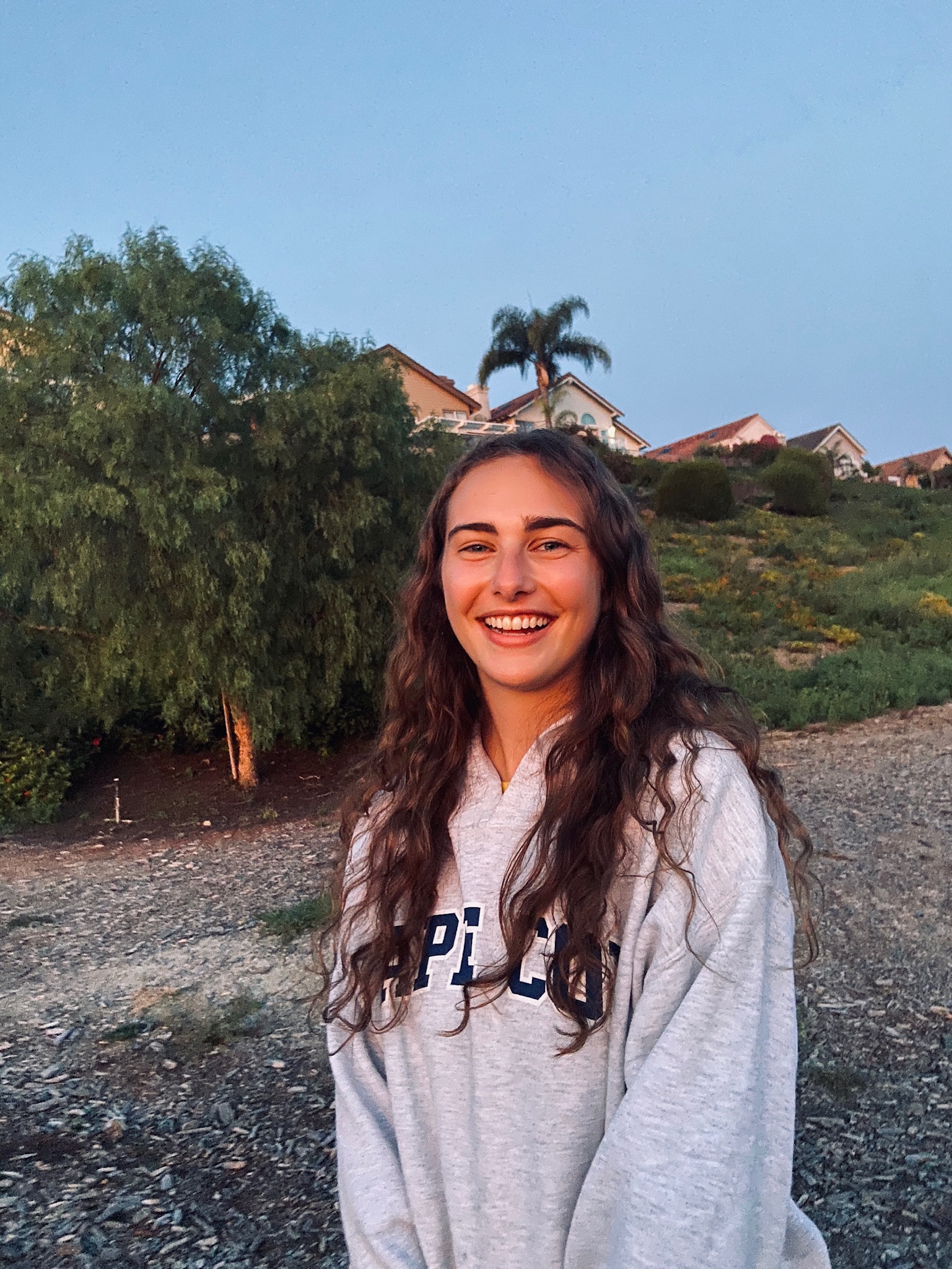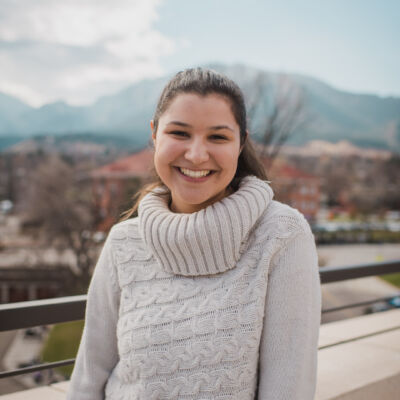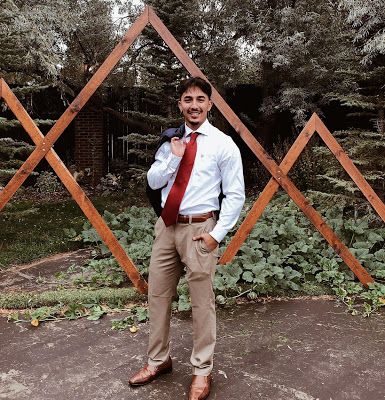Editor's Note
Dear Readers,
As the holiday season has arrived and the fall semester has ended, it’s a perfect time to look back on the past few months and the highlights that we will carry with us.
Our final magazine of this year, “The Ripple Effect,” focuses on the moments that we are grateful for. Claire writes about the valuable lessons herself and four of her friends learned through quarantine; Pablo shares insight into the various ways people can express gratitude; Abby shares her family’s Thanksgiving celebration; and I write about the lesson I learned on how to create a more joyous life.
For me, one of the greatest highlights this year was developing the magazine. I am so thankful for the various people who have helped shape this magazine and inspire me to ask how it can be better.
To my fellow editors who have helped me review stories, thank you. I am so grateful for your help and your close eye. It’s been incredible to work alongside you this semester.
To the writers for this magazine edition and for previous editions, thank you from the bottom of my heart. These magazines would not exist without you. I appreciate your willingness to be adaptable, to be creative and to work hard to create the best stories possible.
And to the readers, I hope these magazine editions have offered you something– whether it be useful information, an intriguing story or idea, or a place of comfort. Through each of our magazines– from talking about how to start the year off right, to mental health among students, to the surrounding world and environment, to reflecting on lessons learned, to expressing gratitude– the goal is to offer our readers something meaningful, in whatever capacity that might be. If you have any questions, ideas or would like to join The Bold Magazine, please feel free to email me: tayler.shaw@colorado.edu or thebold@colorado.edu.
Thank you all for your support and time. I wish you a wonderful holiday season and cannot wait to get started on the next edition!
Warm regards,
Tayler Shaw
Magazine Editor-in-Chief
Shifting mindsets: Finding light in the darkness
By: Claire Purnell
Click here to listen to Claire share her thoughts:
The coronavirus pandemic has caused massive effects on almost all of our lives, and negative ones for most of us. The pandemic shut down schools, jobs, communities, social lives– so many things almost all of us are part of. We were forced into isolation without the things that usually occupy our time and also our minds. In isolation, we had to spend a lot of time on our own and in our own heads. For those of us who struggle with mental illness, this was a really scary task to take on. However, we’re doing it, and we’re learning, changing and growing along the way. I am not grateful for the pandemic, but without it, I would not have learned how to deal with the things that always held me back in life– and for that, I am grateful.
Before the pandemic, the cancellation of plans always took a huge toll on me. I am a planner. It comes with my Type A personality, but it is also something I do to cope with my severe anxiety and depression. Keeping myself busy and having things to look forward to helps me stay optimistic and out of my own head when I can be extremely pessimistic and hard on myself. I could never go with the flow and if something I looked forward to got cancelled, I would spiral and use it as an excuse to stay in bed and wallow in my depression that came when I had free, alone time. COVID-19 cancelled countless events I was looking forward to or were really important to me; the end of my freshman year, formals, Bonnaroo, Forecastle, my 20th birthday, in-person sorority recruitment, in-person classes, several of my spin classes, my grandfather’s funeral and so much more.
It felt like one of my biggest fears was becoming a reality, but even worse than I could ever imagine. I could not accept it at first. I told myself the pandemic won’t last long; it can’t cancel too much of my life. Then, reality hit, and I realized it would be long lasting would cancel so many milestones. I wallowed in the misery and struggled more than I ever had with depression and self-harm as well as countless panic attacks. But then, I learned how to accept it, and how to make the most of the unknown and the unexpected. I learned beautiful moments– like getting to teach a Labor Day outdoor spin class that all my best friends came to — come out of situations we could never predict, and I chose and still choose to always find the best in the present moment.

The fear of the unknown and constant need to plan really held me back in life. I think this past fall semester holds some of my all-time favorite moments because they were spontaneous and unplanned, which is something I rarely experienced before. One main takeaway that has helped me is finally being able to trust that I will always do what I can to make the most of the situation at hand. The pandemic made me prove that to myself. Now, I am less fearful because I have seen myself countless times over the past nine months do everything I can to make myself happy and to enjoy life, whatever it looks like. I am able to do this through accepting what is and finding gratitude. Yes, I wanted to have a “normal” sophomore fall semester– with full spin classes, sorority recruitment, going to classes, football games and walking around campus with friends. Though my peers and I missed many of those events, I did get socially distant, masked up spin classes, and I learned to make the most of those and be so grateful we could even be together in the studio. I am grateful for the pandemic teaching me how to shift my mindset to see the good even in some of the worst circumstances I think we will ever deal with. It gives me hope for the future, knowing I will be okay in almost any situation since I have taught myself how to be okay now.
I am grateful for hitting my rock bottom because I know it made me strong. I can now look at life without fear of going back to a dark place and instead be excited knowing I can take on whatever life brings. I think mindset shifts like this happened for so many of us. I got to ask a few of my friends about their perspectives on “COVID-19 mindset shifts” and how they found gratitude amidst uncertainty.
Bailee’s Mental Shift: Perspectives
Click here to listen to Bailee share her thoughts:

Bailee Esposito, a sophomore at CU Boulder from Stanford, Connecticut, said she is grateful for the time quarantine has afforded to develop a new perspective on how she reacts to challenges. She talks about the beginning of the pandemic involving a lot of big picture reactions, saying “statistics and news didn’t leave much room for personal opinion of reality,” especially with the collective struggle and people seeming to default to saying “at least…” (our families aren’t dead, we are alive, etc.). Things changed when Esposito began to focus less on the outside world and more on herself, realizing while she does not have control over a lot, she does have control over how she reacts.
During the pandemic, Esposito started to think of big concepts in terms of smaller steps, a method she now applies to her daily life. She would look at logical aspects and things she can control: not going out, getting tested when she’s been exposed and using resources. She practices waiting to know an outcome before getting worked up, realizing there is no use in getting upset about something before she has tools to solve it. One main thing she’s focused on is getting comfortable with the worst and best outcomes and knowing she will be ok with both of them; then, once the outcome occurs, she can take the steps necessary to make it better or she can just accept it.
Esposito explains that “letting the world and other people surprise you with things you didn’t expect because you didn’t think about the scenario before it happened” is a key component of her new ability to accept things. “Being happy with the good things that occurred because I wasn’t putting all my eggs in one basket and hoping and praying that it would be the best possible outcome, bc that often does not happen and I think that is one of the main keys to growing up. And I would not have realized this if it wouldn’t have been for this time.”
Halena’s Mental Shift: Priorities
Click here to listen to Halena share her thoughts:

Halena Wetch is a sophomore at CU Boulder, originally from Sacramento, California. She says the pandemic seemed like the end of the world, but the process of going home and being quarantined and isolated really caused her to reflect on her priorities.
“The biggest way that I’ve grown is shifting my priorities to prioritizing my health– mentally, physically and emotionally. I think it’s extremely important, especially at this age when we’re still growing and finding ourselves, to really value our health and make that a priority,” says Wetch.
During the lockdown, Wetch noted she was able to cherish family, realizing this is one of the last times she’ll spend a lot of quality time with her family all in one place. In this time of isolation, she thought about her relationships. She reflected on a popular view of college friendships and how sometimes we focus on the quantity of friends instead of the quality. She says she has learned to prioritize real, meaningful relationships.
“It’s also important to not rely on relationships for happiness,” says Wetch. “I think a lot of people at our age depend on social interactions– going out, hanging out with friends for happiness. That’s a huge part of your happiness but shouldn’t be the main source.”
Wetch finds gratitude in the way isolation shifted her priorities to who she is and who she wants to be. She says, “When I went home, I really learned how to find happiness within myself and how to be okay on my own– and how being alone is okay. A lot of people our age struggle with this.”
Koral’s Mental Shift: The importance of friendship
Click here to listen to Koral share her thoughts:

Koral Villalobos is a freshman at CU Boulder from Brighton, Colorado. For Villalobos, who struggles with anxiety, COVID-19 presented new apprehension and worries, forcing her to reevaluate her usual coping mechanisms. Her main coping mechanisms were all things that were taken away due to the pandemic: her successful soccer career, friendships and enjoyment of her senior year of high school. When isolation began, her anxiety went “through the roof.” Even though Villalobos’s regional soccer championship and high school graduation were cancelled, now that she is in college, she has been able to focus on the little things that make her life better and continues to find new beginnings.
“This pandemic makes you grateful for the most simple things like your friends, like soccer […] I think it’s really important to realize how grateful you are for those little things. Especially when you struggle with mental health, it makes those hard times not so hard when you think about how grateful you are,” says Villalobos .
Adrielle’s Mental Shift: Growth & soul searching
Click here to listen to Adrielle share her thoughts:

Adrielle Baker is a sophomore at CU Boulder from Colorado Springs. COVID-19 ended her first year of college early and she didn’t get the summer she was expecting. She wasn’t able to see her friends for months, and she felt very isolated and alone during quarantine since she has no siblings at home. In April, Baker turned 19 and didn’t get to celebrate with the friends she so dearly missed.
However, she gradually became comfortable being alone and didn’t feel the need to text anyone. She began to read more, exercise more, study more and focus on herself. She became so comfortable doing this, she stopped missing people and longing for company.
To Baker’s surprise, the pandemic affected her more when she came back to school– being on campus, living in a sorority house with 50 other girls and trying to remember what it was like to socialize again. She was left with a lot of anxiety about COVID-19 and social anxiety as well. She ended up spending the majority of the semester at home.
“I am very confident in my belief that everything happens for a reason, and I think this pandemic has helped me see that life is full of the unexpected. But there are still good things that can come out of the negatives. I learned to be happy with who I am, because at the end of the day, I am the only person who has to live with myself forever,” says Baker.
Baker says she has also learned to value her time and the relationships she shares with others.
“I also realized to cherish the little moments of life– the laughs, the hugs, the adventures, the smiles, all of the things that were changed by the pandemic,” says Baker. “Although the last eight months have not been ideal to say the least, I am still filled with so much gratitude. I did a lot of growing because of this pandemic and I did a lot of soul searching that I would not have done otherwise.”
A final note
Even in the darkest of times, there is always something to be grateful for. There is always darkness before the dawn– and maybe it is not the dawn you expected and maybe the darkness is not over yet–, but there is still light to be found: in growth, change and new appreciations.
A few questions regarding gratitude
By: Pablo M. Rodriguez
Click here to listen to Pablo narrate his story:
Gratitude is a fairly simple concept. Merriam-Webster defines gratitude as “the state of being grateful: thankfulness.” Simple. We feel gratitude for any number of reasons in our everyday lives. Sometimes we’re grateful for the little things. Maybe mom and dad sent us a little bit of money today. Last week, we really enjoyed that small bite of our buddy’s sandwich. A few days ago, a sibling left the last cookie in the pantry thinking you might want it. Other times, we’re grateful for big gestures. Imagine if someone were to buy you a new car or maybe broke the bank to get you tickets to a show to see your favorite band. Conventionally, we would appreciate any of the above scenarios, but we wouldn’t quite react in the same way for each one. If we were to say thank you in each case, we would be fulfilling the definition of gratitude— but our gratitude might not stop there. If we return the favor instead of saying thank you, are we still showing gratitude? If we smile or shout with joy, would that register as a stronger level of gratitude? We hardly ever stop to think about how our differing actions of gratitude may be perceived in comparison to the countless thank yous we dole out. I began to question our perception and understanding of gratitude, leading me to ask myself the following questions:
Does gratitude always have to be given to people?
On a warm afternoon, I sit in my spot on the couch with the recliner out and my mug of tea steaming at my side. I leaf through the pages of my book and feel content. It is my Sunday. Well, technically it might be another day of the week, but given my erratic and full work schedule, it is my Sunday. I am so focused on the images of nature that Keuroac’s Dharma Bums paints into my mind that I lose track of reality. Time ceases to exist, and the room melts away into the mug of tea. I am enjoying myself so much that I’m not even realizing I’m enjoying myself. Something grabs my mind and shoves me back into the real world. I instantly become aware of my feelings of contentment and I feel fulfilled. No words were spoken, considering there is nobody to thank for my enjoyment. I didn’t have to return any kind of favor or give any indication of my gratitude to the empty room because the empty room frankly did not care.
What if thank you doesn’t feel like it’s quite enough to measure up to your feelings of gratitude?
It’s a chilly week night in early October. I’m having dinner with some close friends and roommates. I can barely make out the sound of meat sizzling on the stove over Mac Demarco’s voice. There’s bread warming up that I didn’t see go into the oven, but I know it’s there because of the smell of melting butter and roasting garlic. Maybe I helped stir some sauce, but I didn’t have to lift a finger to cook this meal. It’s just a plate of spaghetti, but that first bite really just hit the spot. Of course, thanks are given to the chef, but as I chew through that first bite, my gratitude for the moment stays steady. I feel peaceful and proud of my company. I am thankful to have a full belly, and I realize that my ‘thank you’ just didn’t really capture exactly what I’m feeling. I casually take care of the dishes after the meal is over, perhaps subconsciously trying to further express my gratitude.
What if thank you isn’t quite necessary every time?
It’s the summer of 2020, and I am living with my parents. It’s the end of a long day. There’s an ache in my lower back and my legs have decided that they no longer want to be attached to my body, and they are definitely letting me know. My mind was empty and numb during the rush hour car ride home from work. I literally feel like a pile of mush. I haven’t eaten in at least 8 hours, but I can’t really remember. As I try to carry all my belongings from the car into the house, I find the door locked. I start getting warm with frustration as I try to find my keys with my hands full of junk. After dropping a few things, I get the door open but am starting to get hot with anger. I toss all my things in a pile on my bed and head straight for the fridge. In a tupperware is a very polite looking steak that is sitting quietly next to a handful of greens and a happy little pile of potatoes. I feel my worries drain down from the top of my head until the food takes its place in my body. I am now collected. I am now calm. I am now happy. I am thankful that the food was there. There’s always a meal ready for me to heat up after I get off of work while I’m under my parents’ roof. Thank you isn’t said, but gratitude is felt.
Gratitude is a simple feeling, but it is expressed in many complex ways. That one word can carry so many different meanings and signify so many different actions, but we recognize it all the same. Becoming cognizant of the little ways we show thankfulness instantly makes gratitude more pertinent in life, and adds just another reason to be thankful in the end. Find things to be grateful for, and be mindful of how you show your gratitude.
Thanksgiving Reflections
By: Abby Schirmacher
Below are photos and audio provided by Abby from her Thanksgiving break, documenting her family’s celebrations and traditions.
Click here to listen to Abby’s family share what they are thankful for, a tradition set forth by her mom:
Practicing gratitude: Creating a more joyful life
By: Tayler Shaw
Click here to listen to Tayler narrate her story:
How can we make life enjoyable even during the hardest of times? It’s a question many struggle with at some point. One of the hardest periods of my life was nearly a year ago during the November and December months of 2019. As a junior at CU Boulder, I had overcommitted myself to responsibilities to the point that I was struggling to keep afloat in doing everything I needed to do on a daily basis while enjoying none of the process. I knew it would be a lot of work, managing my school work with my work responsibilities and with my personal struggles. I convinced myself at the beginning of the semester that I would be able to get everything done, that I could manage it all.
However, by the end of the semester, I began falling behind in my classes– sleeping through classes, missing project deadlines, writing papers about books I had barely skimmed– and that’s when the panic really set in. Each day, I felt more disappointed in myself and began projecting negativity outwards. It felt like I was trying to walk across a tightrope while carrying a pile of ten fragile eggs in my bare hands, trying to not crack the eggs while also managing to not fall off the rope as a crowd of spectators watched; and I’m afraid of heights. I had put so much responsibility onto my plate that it almost felt like I could no longer be present in the moment or enjoy the little things. I was so stuck in my head– trapped within my own thoughts– that it felt nearly impossible to ever sit back and smell the roses, because it would be a waste of time to do so.
So I did what any other confused, struggling college student does– I turned to the internet for answers. Countless of motivational and productivity-inspiring podcasts later, I was disappointed that I had not yet found the simple, quick-fix I was desperate for. It made me realize, however, that if I can’t fix the amount of work I have to do, then maybe I can find a way to at least ease some of the frustration and sadness I was feeling on a daily basis. I didn’t find a simple solution; instead, I found a way of thinking that’s helped make the days, even those where it seems like I will be working nonstop, more enjoyable.
The breakthrough came after watching numerous videos of Brené Brown, a research professor who has studied the concepts of courage, vulnerability, shame and empathy for over 20 years. Brown explains in a 2018 article that through 12 years of research and 11,000 pieces of data, she did not find a single case where there was a person who was joyful or felt their life was joyous that did not practice gratitude.
“When I say practice gratitude, [I] don’t mean “the-attitude-of-gratitude” or feeling grateful, I mean practicing gratitude,” writes Brown. “These folks shared in common a tangible gratitude practice.”
Practicing gratitude can look differently for a lot of people, explains Brown. It could be writing a list of three things every day that you are grateful for, or saying what you’re thankful for at the dinner table, or saying out loud at the same time every day something you are grateful for. It’s choosing to actively seek for things to express gratitude for, shifting your mindset away from the self-wallowing or from the stress you’re feeling.
The benefits of actively practicing gratitude prove worthy of your time, as “studies have found that giving thanks and counting blessings can help people sleep better, lower stress and improve interpersonal relationships,” according to an article by NPR.
“It’s life changing,” writes Brown. “There is a great quote by a Jesuit priest that says, ‘It’s not joy that makes us grateful, it’s gratitude that makes us joyful.’”
However, one of the most shocking breakthroughs that I found from Brown was not just that I could make my life more joyful by actively seeking things to be grateful for, but also that joy in of itself is one of the scariest emotions to feel.
“Though I study scary emotions like anger and shame for a living, I think the most terrifying human experience is joy,” Brown explains in an article for O, The Oprah Magazine. “It’s as if we believe that by truly feeling happiness, we’re setting ourselves up for a sucker punch. The problem is, worrying about things that haven’t happened doesn’t protect us from pain.”
Brown explains that in the moments where we feel happy and grateful, we can also feel scared. What if something happens? What if this moment ends? The true test is the ability to realize being afraid doesn’t make you more prepared for tragedy or from pain. Instead, focusing on the fear instead of being present in the moment and actively practicing gratitude results in less joy.
“We simply cannot know joy without embracing vulnerability—and the way to do that is to focus on gratitude, not fear,” writes Brown.
The impact of COVID-19 has been difficult for most, and perhaps it’s taken– either temporarily or permanently– something we are usually grateful for. The hard part, now, is to actively seek in our daily life for something else we are grateful for. It can be hard to not get lost in the worry about the future, to not get lost in our thoughts and fears and disappointments. But doing so doesn’t help change any outcome. It just makes things harder for us. So as this semester ends, as we have more time to ourselves and for reflection in preparation of the upcoming year, I encourage you to practice gratitude and embrace the things you are grateful for in the present moment.
It’s currently 9 a.m. on a Monday morning as I write this. Here’s my list so far: the sunrise, a hot cup of coffee, my dog and cat cuddling up to me on the couch and the fuzzy blanket that’s keeping me warm as I type on my laptop.
What’s your list?
Magazine Contributors

Tayler Shaw is a senior majoring in journalism and Spanish for the professions and minoring in anthropology and leadership studies. She is from Littleton, Colorado. Her interests include explanatory and solutions journalism on topics ranging from education, culture and community-based issues.

Claire Purnell is a sophomore journalism major at CU Boulder. She is from Louisville, Kentucky. She ended her ice dancing career in 2019 to follow her dreams of being a writer and to experience a normal college life. Claire is now a spin instructor, Diversity co-chair of her sorority (Alpha Phi) and she loves all things health, happiness and fitness.

Abby Schirmacher is a junior majoring in journalism and minoring in business and sociology. She is from Erie, Colorado. Abby enjoys spending time with her family and friends, binge watching her favorite Netflix shows and studying at local coffee shops. She also loves to read, write and hike in her free time.

Pablo M. Rodriguez is a sophomore majoring in strategic communications and minoring in Spanish and creative technology & design. He is from Lakewood, Colorado, and enjoys reading classic literature, all things health and wellness and keeping up with the Los Angeles Dodgers.

